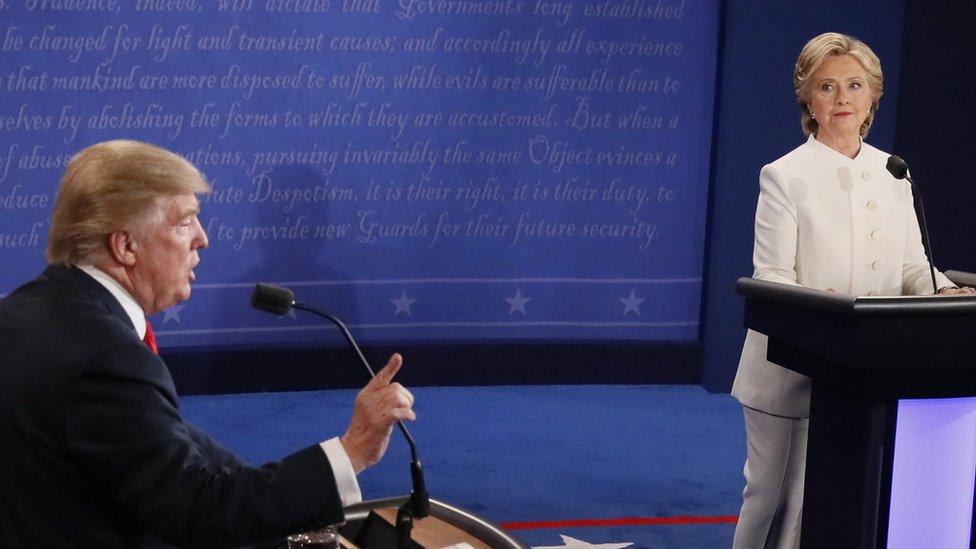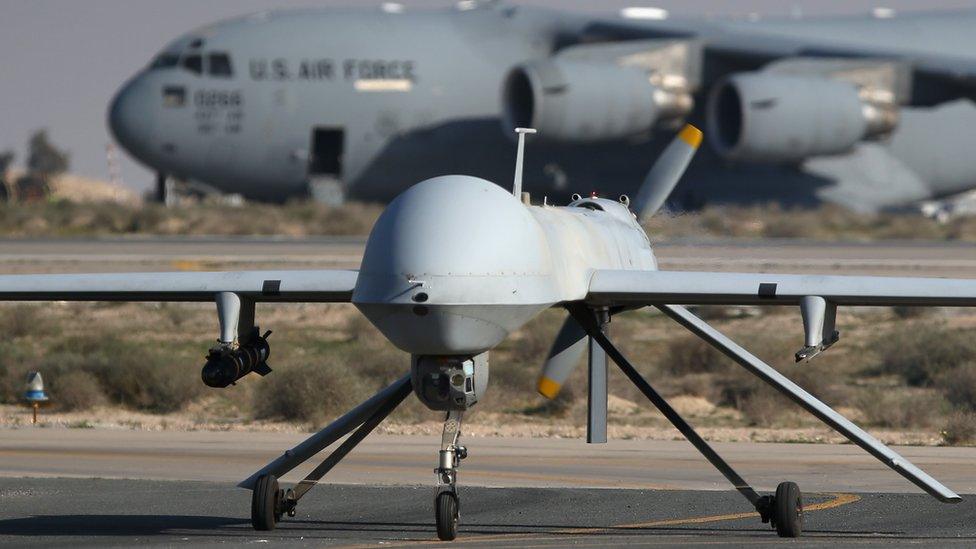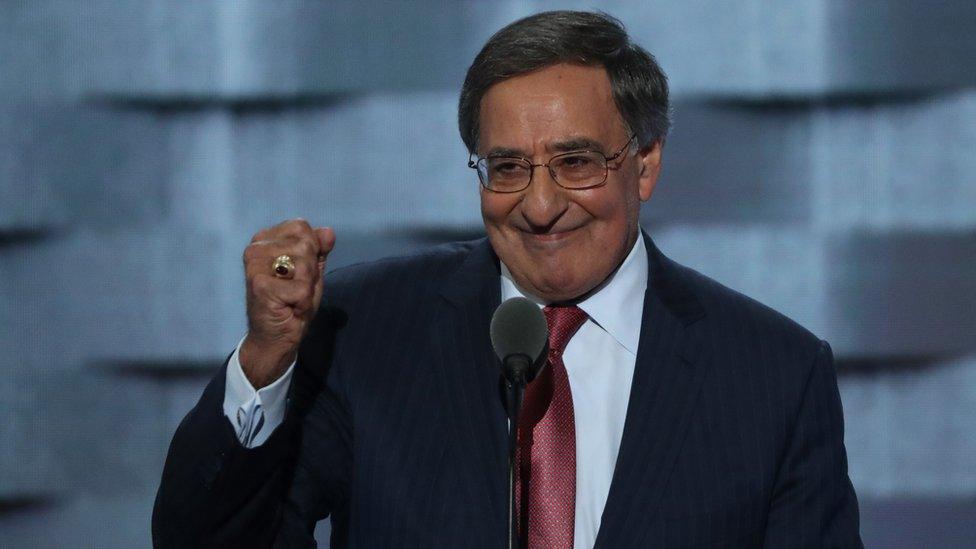US election 2016: What next for US foreign policy?
- Published

America will likely emerge from the presidential election with a foreign policy that continues the recent trend of avoiding major foreign conflicts in order to focus on domestic issues - something you would hardly guess from the radically different foreign policy platforms of the two presidential candidates.
How so?
In the first place advisers close to both of them tend to emphasise that some of the more controversial policies they have advocated - such as Donald Trump's suggestion he will renegotiate the North America Free Trade Agreement, or Hillary Clinton's that she backed a no-fly zone in Syria - are actually less radical than they appear and would involve "more of the same" rather than dramatic change.
While Republicans lambast President Barack Obama for "abandoning" global leadership, and some suggest Hillary Clinton would be more interventionist, in truth whoever is elected will seek to avoid any repetition of what happened in Iraq and Afghanistan.
These were hugely expensive, enduring military commitments that many Americans feel they can ill afford now.
"The United States is going through an interesting period here," Leon Panetta, the former Defence Secretary and Director of Central Intelligence told the BBC, "and there's no question that there is a certain exhaustion about having confronted all of these challenges during that period and the price we paid. It's reflected not just in the Democratic party but in the Republican party as well."
'Trump the person'
On free trade also it may be that the choice between Clinton and Trump is not quite as radical as it first appears.
While Mrs Clinton is an ardent advocate of free trade deals, the left of her party has joined the Republicans in arguing that a new treaty signed earlier this year (the Trans-Pacific Partnership) should not be ratified and questioned the need also for a future pact with Europe.
"Separate the bill of particulars from Trump the person," says Danielle Pletka of the American Enterprise Institute about free trade, burden sharing among Nato allies or military cuts, "and the reality is, these complaints make sense, and Congress has the constitutional and political power to do something about it."
The likelihood that neither candidate could obtain a clean sweep, winning the White House, Senate and House of Representatives, means they are likely to be limited in their ability to deliver much of their platform.

Will American policy in the Middle East change?
If, as polls suggest is likely, Mrs Clinton wins the presidency but the Republicans retain the majority in the House, then many predict partisan fighting and gridlock even more bitter than that which has characterised President Obama's second term.
So it's quite likely that either presidential candidate's trade policy could get stymied in Congress.
Talking about Mr Trump's platform on trade to Carlos Gimenez, the Republican mayor of Miami, a city highly dependent on foreign commerce, he said to me: "The good thing about America is that we don't have kings… we have a division of power", noting that Florida's US senators and representatives would protect its interests in Washington.
As for suggestions from the stump by his party's nominee that the US might raise tariffs on some cheap foreign goods or products where American jobs had been outsourced abroad, Mr Gimenez said that erecting such barriers "really doesn't work", adding, "we do need free trade".
That, though, is a viewpoint from a particularly cosmopolitan city and what does seem to be happening, as a long-term trend, is that the US is growing less interested in its global leadership role, as well as in advancing free trade deals, while growing more preoccupied with its domestic policies and divisions.
Domestic constraints
Mr Panetta told us of his concerns about the US rowing back from its global leadership.
"The United States hoped that others would step up to the plate," he said, referring to the Obama years, but "it didn't happen, and our national security became challenged as a result of that.
"That's something the American people now understand that if the United States does not provide that leadership unfortunately no-one else will."

Leon Panetta is concerned America has stepped back from global leadership
While Mr Panetta and much of the Washington foreign policy establishment would see Ms Clinton as a far better bet, in terms of exerting a positive role in world affairs, her freedom of action will be limited by new great power realities as well as domestic political constraints.
In recent months Russia has filled the void in Syria, while bolstering ties with a host of other Middle East states.
China, too, is not only catching up fast with the US economically, but is preparing diplomatically and militarily to shut America out of sensitive regions like the South China Sea.
This sense that the US may be slipping in the world of power politics has prompted Mr Trump to suggest higher defence spending and tougher trade policies towards China.
The two candidates present a curious paradox here - with him proposing to spend more on a military he would use less, while Mrs Clinton suggests a more active role for forces continuing to run down under the current administration's plans.
Neither candidate, though, can address frankly the relative change in the international order that results from countries like China or Russia spending heavily on their forces and having a greater will to use them.
Indeed a presidential election, full as it is of paeans to the country's greatness, may be the worst time to discuss the growing limits on its power in a world the foreign policy wonks describe as increasingly "multi-polar".
Seen that way, Mr Trump's insistence that he will not commit the country to more foreign wars, or the suggestion by Mrs Clinton's advisers that her Syria policy would not involve major escalation can be seen as a kind of continuity.
President Obama after all was proud, as he put it, to have brought US soldiers home from two wars and to have placed strict limits on America's involvement in Libya and Syria.
Mark Urban is diplomatic and defence editor for BBC Newsnight. You can follow him on Twitter, external and read more from him on his blog.


Predict the president


